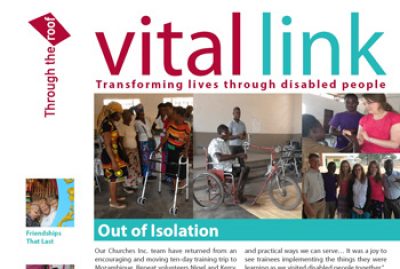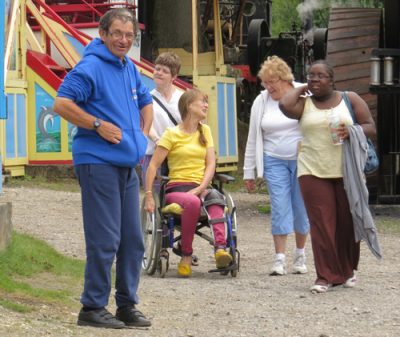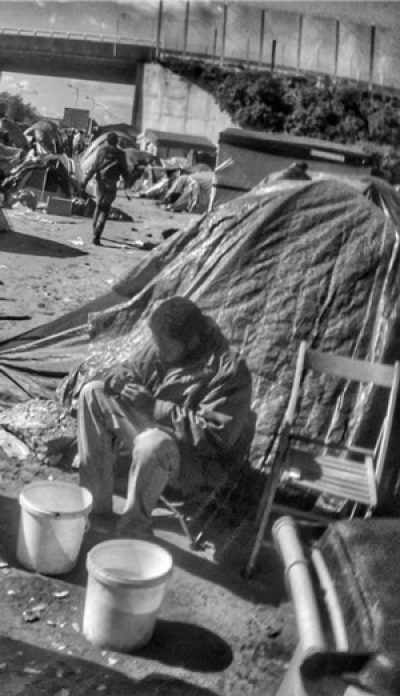An awesome thing
'Out of Isolation' - the Autumn 2015 Vital Link Newsletter

The Autumn/Winter 2015 Vital Link is now available for download. This issue contains stories from our freedom-giving training in Mozambique, holiday reports from Treloar and Babbacombe, an update on the Wheels distribution in Kosovo, and much more. Take a look!
- Please 'Right-Click' and save the file. Please note that a donation form is included in this download.
Please get in touch (on 01372 749955 or by following this link to email us) if you have any problems downloading this, or if you’d like to receive future newsletters by post or email.
Don't Make Him Come Down There! (Ros' Blog)

I wrote this script for performance at my church last Christmas. The cast consists of just 5 angels. As I re-read it recently, it occurred to me that it could easily be played by a cast of disabled actors. Apart from the 2 angels at the beginning who are pointing out things they can see, it would make no difference if any of them were visually impaired. Most of the lines are simple enough to be mastered by someone with a learning disability (or the script could be pre-recorded and played over the performance if learning lines was too much of a challenge). When Exultato threads his/her way slowly though the congregation to the front, it would work perfectly well played by an actor in a wheelchair – and so on. Perhaps the only ability required is the ability to dress up in a white robe and a pair of wings! You are at liberty to change the names of the angels if you think these would cause confusion. Feel free to use it at your church, but if you do so, please mention Through the Roof somewhere on your programme or advertising.
Don’t make Him come down there! (A script for Christmas)
Cast: 5 angels, named Incredulo, Sympathico, Fideo, Jubilato, and Exultato
2 angels stand front of stage, shielding their eyes with their hands and peering intently at the audience.
Incredulo: Just look at them down there.
Sympathico: (turning aside) To be honest, I’d rather not.
Incredulo: (nodding) Not exactly a pretty sight, are they?
Sympathico: Well here’s the thing. I think they are a pretty sight. But I don’t think they can see that. That’s why they do the things they do to each other.
Incredulo: (pointing into the far distance, not at the congregation) Look at those ones over there. What are they doing?
Sympathico: I think they call it fighting.
Incredulo: Why?
Sympathico: (pointing at different groups in the distance) Because these ones want the land that belongs to those ones. So they attack them and try to take it from them.
Incredulo: Unbelievable!
Congregational carol: It came upon the midnight clear
Fideo comes running in from the side.
Fideo: O my goodness, I can’t believe what I’m seeing.
Sympathico: What?
Fideo: All kinds of things! They’re hurting each other, they’re hurting themselves, and they can’t seem to stop.
Incredulo: Unbelievable!
Sympathico: Living up here, I never dreamed there could be so much pain and unhappiness.
Incredulo: Doesn’t God see what they’re doing?
Sympathico: Of course He sees; He sees everything.
Fideo: Don’t they realise how powerful He is?
Sympathico: I guess not, or they wouldn’t want to cross Him!
Fideo: (Turning to congregation and wagging his finger) Don’t make Him come down there! You’ll regret it! Just don’t make Him come down there!
Congregational carol: O little town of Bethlehem
Jubilato comes running in from the other side
Jubilato: Have you heard? Have you heard?
Incredulo: }
Sympathico: } (in unison) Heard what?
Fideo: }
Jubilato: He’s going down there! Everyone says He’s going down there to sort them out.
Fideo: Oh no! I warned them!
Sympathico: They’ve had it now!
Fideo: I suppose He plans to destroy them and start again with a new creation.
Jubilato: Well, they’ve had it coming. They’ve asked for it.
Solo or small group: Nothing will ever be the same again (Graham Kendrick)
Another angel, Exultato enters silently at the back of the room and threads his/her way through the congregation to the front, joins the other angels, then slowly turns and faces the congregation.
Exultato: (in tones of wonder) Have you heard?
Incredulo: Yes, we’ve heard.
All: He’s going down there!
Exultato: Yes, but have you heard the rest?
Incredulo: No, but we can guess.
Fideo: I warned them. I warned them not to make Him come down there.
Sympathico: It’s curtains for them now.
Exultato: No, no, it’s not like that at all! He’s not going to destroy them, He’s going to save them!
Incredulo: Unbelievable!
Congregational carol: Joy to the world
Sympathico: So what’s the story?
Exultato: He’s going down there, but that’s not all, He’s going to become one of them.
Incredulo: What, a human?
Exultato: Yes.
Incredulo: Unbelievable!
Exultato: More unbelievable than you think. He’s going to contain the whole of Himself in one human embryo and be born as a baby and grow up among them.
(Incredulo’s jaw drops and he stands, open-mouthed)
Fideo: Unbelievable. (Points at Incredulo) He’s speechless.
Congregational carol: O little town of Bethlehem
Sympathico: I guess we were all overlooking one thing.
Fideo: What?
Sympathico: He really, really loves them. He would never destroy them.
Exultato: It’s more amazing than you think. He loves them so much, He would actually rather die than live without them. And if that’s what it takes to save them, He’ll do it.
Incredulo: Unbelievable! But it must be true. Amazing!
Solo or small group: Earth lies spellbound in darkness (Graham Kendrick)
Optional: Sermon at this point
Congregational carol: Hark the Herald angels sing
Outside Our Four Walls (Ros' Blog)

There are comparatively few instances in the Gospels where we see Jesus in the religious environment. There is the occasion when He was twelve years old and His parents lost Him on their way home from Jerusalem, and found Him in discussion with the religious leaders in the temple. And there was the time at the synagogue, recorded by both Mark and Luke, when He set out the mandate for His ministry, based on His reading from Isaiah 61. At least one of His healings took place at the synagogue.
But these were the exceptions. Jesus was not in the habit of occupying the pulpit; nor did He have a publicity machine that organised campaign meetings with slick advertising. In short, He didn’t expect people to come to Him; He went to where they were.
Jesus was most often to be found in the domestic environment like the home at Bethany, or the workplace, where fishermen were drying their nets, for example. This is why so many of His stories drew on the lives of ordinary people – a woman who has lost a coin from her wedding headband; a farmer scattering seed; a judge refusing to give a woman justice; an employer hiring workers for his grape harvest; a wayward son whose greed leads him to insult his parents and leave home.
Even when He taught large crowds, it was not because He had set up an evangelistic crusade, but because they had followed Him up a mountain or out onto the seashore. He was present with them often enough for them to realise there was something about Him that was worth following.
The early Church followed His model. Yes, we read of them meeting in Solomon’s portico within the temple precincts. But more often we read of them breaking bread from house to house, sitting down and working alongside other tent makers, responding to people they met in the street, or heading for a river bank where they knew the worship of Greek gods would be taking place.
For a long time, the church of the twentieth and twenty-first centuries seems to have abandoned this Biblical model. We build our wheelchair ramps, put in our induction loops and wait for people to come to us. We can’t help it if there are not many disabled people in our congregations; if they don’t come, it’s not our fault. From time to time we hold an evangelistic outreach with a big name speaker in a frantic attempt to get people to come in (although reaching the disabled community is seldom uppermost in the organisers’ minds, I’m sure), with varying degrees of success, often temporary. Hopefully the tide is now turning, but there is still some way to go.
Where would Jesus be if He’d been born today? I’m pretty sure He would be serving at the local food bank, going swimming with the Down’s Syndrome lad next door, having a coffee with the lady in the wheelchair so He can ask her advice about the best present to buy His mother, carrying the shopping home for the elderly veteran in the supermarket queue, accepting a meal from the housebound person who can’t get out to meetings but wants fellowship all the same, helping the blind lady to fill out her forty-two page Employment and Support Allowance form, maybe even asking his deaf neighbour for help filling out His own Job Seeker’s Allowance form!
By the time He had done all that, I don’t think He would be having to look for gimmicks to get people to come to church; if He was there they would go, just to be near Him. I’m sure, in fact, that He would be less interested in 'going to church' than in 'being the Church'. And here’s the mystery of being one with Christ; when we go out and do these things, we’re not just being like Him; we’re not just following His example; we are actually being Christ in those situations. We are bringing Him to the people around us, not in some figurative way but literally. People will gravitate to us, not simply because we’ve been nice to them but because the life of God in us is like a magnet, it’s the power of the Holy Spirit drawing people to Jesus.
My church has recently decided to come out of its four walls and go to where the people are. We’ve sold our building, and are meeting in various locations in the community. It’s not entirely clear how this is going to develop over time, but like Abraham we have obeyed a call to leave home without knowing entirely where we are going, except that God is calling us deep into the heart of our community. I’m not suggesting it would be right for every church to do that; for some their building is what enables them to serve the community. I am encouraging us to try and follow the Biblical model of going where the people are – including disabled people – and not just hoping they’ll come to us.
Beauty in Decay (Ros' Blog)

I have just come back from a week’s holiday in the North Yorkshire Moors. The weather has been glorious and I’ve divided my time between reading and walking in the stunning North Yorkshire countryside. I haven’t needed a coat – in fact, if it hadn’t been for the varied hues of the trees I could have thought it was early summer, not October.
And this got me thinking. The trees can be truly spectacular at this time of year, especially in the golden autumn sunlight, but the reason for their beauty is that something is dying. The vibrant tapestry of colour is in truth a symptom of decay. And yet, within the manifestation of death is the secret of life, because these leaves as they fall to the ground and decompose, becoming subsumed into the soil, will provide the nourishment that ensures the ongoing life and health of the tree from which they fell.
How typical of God, to take something that is dying and clothe it in beauty! There is a parallel here to the way in which He works in our lives. This is true for everyone who follows Jesus, but perhaps it is more explicitly experienced and understood by those who live with physical weakness and disability, particularly those whose conditions are degenerative, for whom weakness is a progressive pathway.
Paul, with his painful eye condition, understood this well: “Therefore we do not lose heart, but though our outer man is decaying, yet our inner man is being renewed day by day. For momentary, light affliction is producing for us an eternal weight of glory far beyond all comparison, while we look not at the things which are seen, but at the things which are not seen; for the things which are seen are temporal, but the things which are not seen are eternal.” (2 Corinthians 4. 16-18, NASB)
Like the tree divesting itself of its summer foliage, our bodies are in a gradual state of decay – this is the part we can see. But, just like the unseen microbes which bring about the eventual decomposition of the leaves, turning them into nourishment for the life of the tree, there is something going on in us unseen, something of the Spirit of God which is refining us and making our inner self more Christlike. It’s not for nothing that the English word humility derives from the Latin word for the decayed, organic component of soil – humus.
If we allow the outward decay of our bodies to work in us the character of Christ, not only will the germ of eternal life be doing its work in the depths of who we are, but, like the autumn trees, we will find that there is something very beautiful about the process.
An Introduction to Through the Roof

Find out all about Through the Roof in our new video, 'An Introduction to Through the Roof'. This video, which talks about all our different programmes and features short interviews with supporters and volunteers, has been produced through the hard work of 3 Strands Media. We hope you enjoy it - please share it around anyone you think might benefit from knowing more about TTR!
Disabled, Homeless, Unwanted… (Ros' Blog)

Just over a year ago I wrote a blog post about the terrible plight of disabled Iraqi Christians, many of whom were internally displaced refugees. Now we have a vast number of people on the move, fleeing unimaginable horrors in places like Eritrea, Chad, Sudan, Iraq and Syria, not to mention a significant number in Latin America.
The United Nations High Commission for Refugees (UNHCR) estimates that of the 51 million refugees in the world today, 7.7 million are disabled. A study by the Women’s Refugee Commission found that disabled refugees encounter societal, environmental and communication barriers that make it difficult for them to access humanitarian aid.
One of the biggest problems faced by disabled refugees of all ages is social exclusion, stigmatisation and even violence. People who are innately vulnerable find their vulnerability heightened by their displacement from home. Since very few of the mainstream disability organisations work specifically with refugees, there is very little support for them.
In the Old Testament God gave instructions about people who migrated to join the community of the Children of Israel: “Do not mistreat or oppress a foreigner, for you were foreigners in Egypt.” (Exodus 10. 21). “You are to treat the resident alien the same way you treat the native born among you—love him like yourself, since you were foreigners in the land of Egypt.” (Leviticus 19. 34). “And you are to love those who are foreigners, for you yourselves were foreigners in Egypt.” (Deuteronomy 10.19). It’s hardly surprising if Jesus has a special place in His heart for refugees, since He spent His early life on earth as a refugee in Egypt fleeing a government that sought to kill Him.
There appears to be only one scheme specifically targeting disabled asylum seekers – a project for teaching British Sign Language and providing life coaching to deaf refugees. International conventions provide for disabled asylum seekers whose applications are being processed to be granted benefits which are normally only paid to people who have met certain contribution conditions, and that they must receive the protection afforded by conventions on disability discrimination. The Trust Fund for Handicapped Refugees was set up with money from the Nobel Peace Prize. In any case, UNHCR has always seen resettlement of disabled people as a last resort, preferring to prioritise their integration into their own communities.
But in the present crisis, none of this is of much help to a disabled refugee. Remaining in their own communities means certain death in many of the current areas of conflict, especially in regions where a stigma is attached to disability, and disabled people’s lives are not valued. Most Western countries are doing all they can to keep refugees out, and the countries bordering the conflict zones are so swamped with the sheer numbers of destitute people in need of help that distinguishing which ones are disabled and making extra provision is currently out of the question.
No one knows exactly how many disabled people there are among the refugees and internally displaced persons trying to make their way to a place of safety at present, but with 11 million of Syria’s 20 million population having had to flee their homes, and 4 million of them having managed to leave Syria, the numbers are clearly going to be considerable and UNHCR’s estimate may be a conservative one.
So what can we do in the face of such an overwhelming need? Once again, as I wrote just over a year ago, a key part of our role in the world as representatives of God’s kingdom is to pray that His Kingdom will come and His will be done throughout the world. We can pray that God will move hard hearts and that a spirit of compassion will arise for the millions of homeless people wandering the globe in search of safety. Those of us who are able can write and urge governments to give sanctuary to those who need it. All over the country, groups of people are collecting, storing and sorting aid to be shipped out to refugees. Wherever you live in the UK, there will be such a group near you because they are spreading like wildfire. And, in the face of need on such a huge scale, let’s remind ourselves that God is still sovereign, none of this has taken Him by surprise, and He is still the God who hears and answers the cry of the needy and oppressed.
Photograph courtesy of Viv Dawes, follow this link to her website.
All of Us Complete in Christ

Through the Roof asked disabled people from across the UK four questions about church. This easy-to-read research document contains their answers, plus a whole range of suggestions and good ideas to help your church become the most welcoming and inclusive place it can be.
Follow this link for the PDF of All of Us Complete in Christ (2MB download)
Do you want ongoing support with making your church a more welcoming and inclusive place, or do you have stories you'd like to share with others? We can support you to become a 'Roofbreaker' in your church follow this link to find out more.
We'd love to hear your comments and feedback about the findings, please Facebook, Tweet, e-mail or phone us...
- Follow this link for our Facebook page
- Follow this link for our Twitter page
- Follow this link to email the office or ring us on 01372 749955
The Assisted Dying Bill

The Assisted Dying Bill is to be debated in the House of Commons on Friday 11th September. Through the Roof has issued a full briefing on this matter (follow this link to read that briefing, but we also recommend that people read the statement issued by the Church of England’s national adviser on medical ethics: follow this link to read the statement. Any relaxation of the prohibition on ending life prematurely would make disabled people in this country feel very vulnerable, especially as they are already subject to pressure to refuse resuscitation in circumstances where other people would not (follow this link to change.org for more information on that). Fiona Bruce MP states that most MPs are undecided on this and will be swayed by their constituents’ views. Through the Roof would therefore encourage you to write to your MP (find their contact details by following this link to www.writetothem.com) and urge them to vote against this piece of legislation.
Extract from briefing on Rob Marris MP’s Assisted Dying Bill
- What does the bill propose?
- The bill would allow someone who has a terminal illness and is expected to die in the next six months to request a physician-assisted suicide provided that they have a voluntary, clear, settled and informed wish to end their own life, and have been offered all palliative care alternatives. It does not allow a doctor to end a patient’s life, but allows the doctor to give the patient whatever drugs and assistive devices they might need in order to end their own life.
- What has happened in other countries which have a law like this?
- In Holland, Belgium, Switzerland and Oregon where a physician-assisted death is permitted, some common patterns have emerged:
- There is no real way to ensure that someone is not being coerced into taking this decision e.g. by relatives who stand to benefit from the person’s will.
- Very tightly defined laws have gradually expanded to include many cases originally outside the remit of the law. This has happened not by amendments being made to the law, but by stretching the definitions of terms included in the law – e.g. “unbearable pain” has been extended to include depression and “terminal illness” to include psychiatric conditions previously considered treatable.
- A massive year-on-year increase in the numbers of assisted deaths has ensued.
- There have been disputed cases where it is believed someone was killed against their own or their family’s wishes.
- The practice has gone beyond voluntary assisted death to involuntary euthanasia.
- There is not one single example of a country where this law has been enacted and these effects have not been observed.
- Are there any other worrying factors?
- There has been a blurring of ethical lines, so that organisations drafting and promoting the legislation are distributing the lethal drugs, and stand to profit financially as well as ideologically from an increase in assisted deaths.
- There is evidence of doctors failing to report assisted deaths to the proper authorities, so that the reported assisted deaths do not accurately reflect the actual numbers.
- A breakdown of trust has occurred between doctors and patients so that in Holland 10,000 people now carry anti-euthanasia passports for fear of being killed by doctors in the event of an illness or accident.
- In this country, Baroness Warnock has been advocating for a duty to die, that people should not have the right to be a burden to their relatives or the NHS. This is morally very different from a right to die.
- Already in the UK, healthy young people with a normal life expectancy are routinely and repeatedly invited to have “Do Not Resuscitate” written on their medical notes simply because they have a disability – something no one would ask their non-disabled peers. (see This Change.org site for more details)
- Does assisted suicide always work?
- According to a BBC report, attempts at assisted suicide fail to lead to an easy death in almost one in five cases. There is evidence from Holland and Oregon of supposedly fatal doses leading to nothing other than gasping, vomiting and comas from which the patient later recovered.
- In 18% of cases doctors felt the need to intervene. In countries where active euthanasia is permitted, this intervention takes the form of the doctor administering a lethal injection. The Marris bill does not provide for active euthanasia so we can expect to see cases like the one in Oregon where, after a man took the prescribed dose of lethal drugs, physical symptoms were so disturbing that his wife called 911. He was taken from his home to a hospital where he was revived.
- Why shouldn’t people have the right to an assisted death?
- It is usually the “worried well” who favour assisted suicide – all the major disability organisations in this country oppose it because of the danger it would pose to vulnerable disabled people.
- There is abundant evidence that such laws lead to mistakes and abuses which can never be put right.
- Financially hard-pressed NHS trusts will be tempted to offer assisted death instead of costly treatment.
- As a society we have always been clear that suicide is not something to be encouraged. This law would change that, and in so doing would change something fundamental in the foundations of our society.
- What is a Christian response?
- The Bible has always been clear that humans are made in the image of God, and to take a human life is a grave sin.
- These truths are also enshrined in the Catechism of the Catholic Church.
- Jean Vanier points out that our value comes not from the quality of our life or our ability to be productive but from being loved by God.
- This law would damage both the protection for vulnerable individuals and the nature of our society.
- It is part of being human that we show compassion to people at the cost of some personal sacrifice, rather than viewing them as a burden.
- The only guaranteed safeguard to disabled people’s right to life is not to have an assisted dying law.
- 7. What can I do?
- Contact your MP (www.writetothem.com) Most of them have not yet decided how to vote. Your email might sway your MP.
- Join a protest outside the Houses of Parliament during Friday’s debate (follow this link for more details.)
- Pray. There is a battle for the heart of our country and we should be employing our spiritual weapon of prayer in the fight against evil.
Yes.
The full text of this briefing can be found by following this link and downloading the full text in a word document


